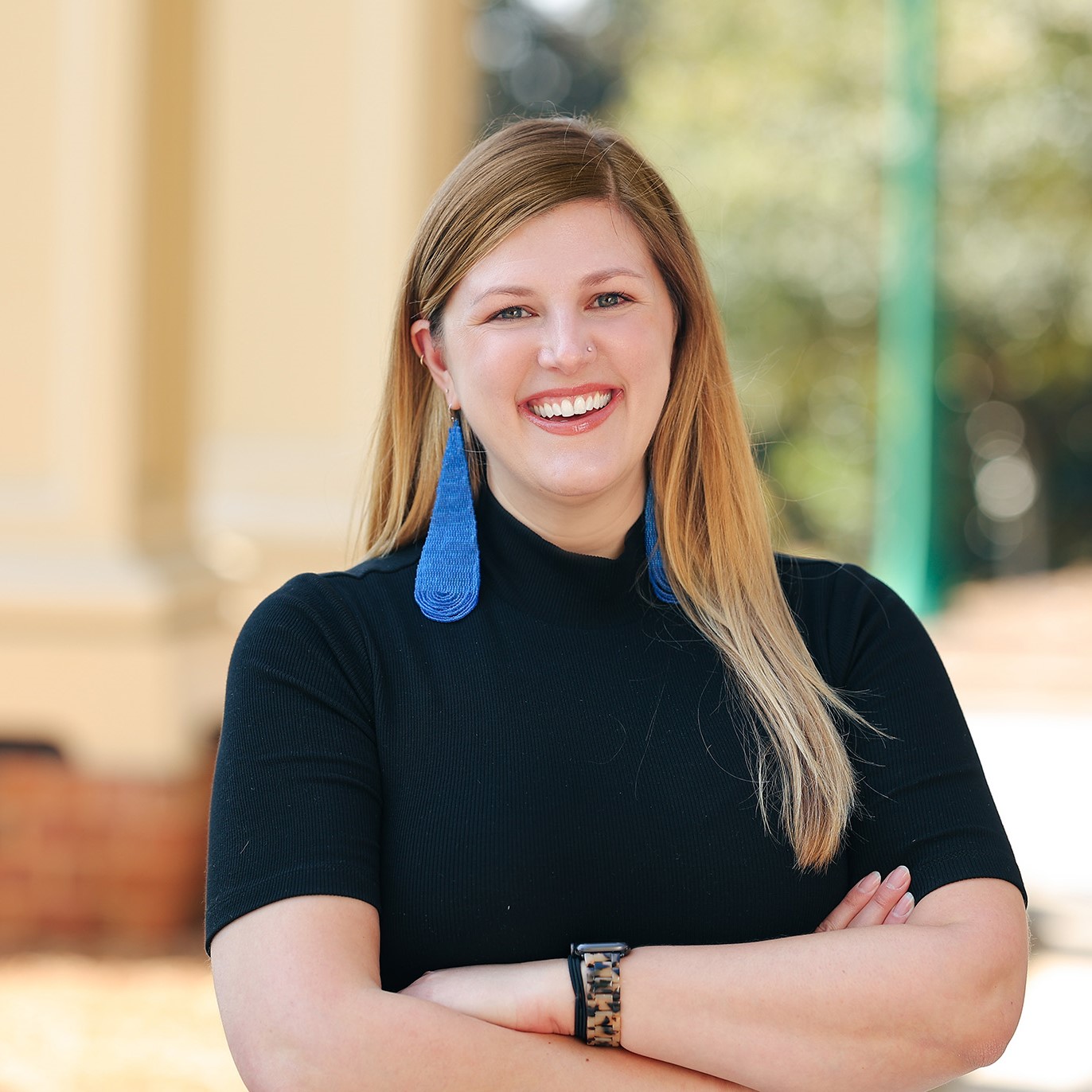Using the MPA at the intersection of education, nonprofit work, and government

We recently had the pleasure of connecting with Elizabeth Anderson, a UNC MPA/MSW dual degree alumnus and a dedicated advocate for education and youth development. Anderson serves as the Director of the North Carolina Center for Afterschool Programs (NC CAP). In our conversation, we explored her journey into nonprofit work, the vital role after-school programs play in children’s education, and how she mobilized her MPA/MSW degree to shape her career path.
Q: Can you tell me a little about your current role?
Absolutely! I am the Director of the North Carolina Center for Afterschool Programs (NC CAP), which is a statewide afterschool network in North Carolina. It’s a coalition of partners from nonprofit organizations, government agencies, public schools, and more. We work together to ensure access to high-quality out-of-school time learning opportunities. NC CAP is part of the Public School Forum of North Carolina, which focuses more broadly on education advocacy in the state. However, my role is specifically focused on after-school and summer programs, as well as any learning opportunities that take place outside the classroom. Considering that kids spend about 80% of their time outside the classroom, we focus on ensuring those hours are filled with enriching learning experiences.
Q: That’s incredible! What are some specific programs or initiatives you’ve worked on at NC CAP?
We do a lot at NC CAP! One of our programs focuses on supporting professional development for out-of-school time providers. For instance, we have a STEM Hub that helps providers, who may not have a background in STEM, feel confident in delivering high-quality STEM programming. We also host advocacy events, like our upcoming “Lights on Afterschool,” where we bring together elected officials, students, and stakeholders to raise awareness about the importance of afterschool programs.
Additionally, we prepare talking points and policy agendas to empower other advocates to push for more public investment in out-of-school programs. We also serve as a research clearinghouse for best practices and conduct landscape analyses of what out-of-school programs are available in different regions of North Carolina. Lastly, we convene stakeholders—whether through regional meetings or our annual conference—to discuss how to improve the out-of-school time system.
Q: What is your most recent ‘win’ at work?
I think in the past year or so my favorite “win” happened in Western NC, where we conducted a landscape study of afterschool programs and launched the Western NC After 3PM Collaborative – a collective impact and peer learning group for youth development professionals – in partnership with the Dogwood Health Trust. We used Community Based Participatory Research methods to get really deep community engagement in our landscape study. The connections we made & relationships we built when we traveled in Western NC for the study helped make the launch of our Collaborative successful. Our work is all about genuine connection and relationships and I think we’ve had a lot of success building those relationships through WNC After 3PM Collaborative in Western NC. Those relationships have been critical as we work to support afterschool programs and the kids and families they serve in the wake of Tropical Storm Helene and we would not be able to provide the kind of support that we have been providing post-hurricane if we had not had those strong relationships in place.
Q: You have such a diverse set of responsibilities! What was your educational and professional journey to this role?
My bachelor’s degree was in journalism, and after graduating, I moved into nonprofit work, focusing on youth development. My first big step in education was working in the education department at the Georgia O’Keeffe Museum in New Mexico. That experience led me to take on more roles in out-of-school time, including working as a site director for various programs and as a coordinator with Communities in Schools of New Mexico. In these roles, I was embedded in the public school system and coordinated wraparound services for both schools and individual students.
Through these experiences, I began to see how broken many systems were, and I wanted to work on a broader level to create systems that actually serve kids and families. That’s when I decided to pursue an MPA and MSW through the dual-degree program at UNC.
Q: What is one current challenge or thing you’re working towards?
We are working on building our capacity as a Statewide Afterschool Network and growth is hard! There is so much that we want to be doing and could be doing, but there are always growing pains when you work to expand. You have to think about how to grow that in a way that is sustainable and aligned with mission and vision. It can be a little bit messy – but very worth it in the long run.
Q: How was balancing the MPA and MSW programs at UNC?
It was definitely a challenge! There was a lot of negotiation, especially with aligning the Public Work Experience (PWE) for the MPA with the second-year practicum for the MSW. However, I received great support from both the MPA and MSW programs. There was also some coursework overlap between the two programs, especially since I focused on macro practice in social work.
I found the combination of both degrees incredibly helpful. The MPA gave me a broad understanding of cross-sector collaboration, which is critical in my role now, while the MSW provided me with deeper content knowledge on child welfare, poverty policy, and supporting kids and families.
Q: Did you always know you wanted to work in youth development?
I knew I wanted to support kids and families, but I wasn’t exactly sure what that would look like. During my Master’s program, one of my practicums was with UNC Refugee Wellness, which had me working with refugee mental health. For a while, I thought I might want to work with immigrant and refugee children, but my long history in education led me back to that field. The dual-degree program helped elevate my capacity to work at a systems level, particularly in bringing together nonprofits, government agencies, and other partners for a common goal—supporting kids.
Q: What advice would you give to prospective or current MPA students?
Stay open-minded. Many people come into the program thinking they know exactly what they want to do, but your interests and career goals can evolve. For example, I took a performance management class that I didn’t think I would ever need, but now I use those skills every day! The MPA program prepares you as a generalist, which is great because it opens a lot of doors and gives you options when you finish.
Q: How was the transition from full-time work to being a full-time student?
It was a good change of pace. My time in the workforce helped me contextualize a lot of what I was learning in class. I had real-world experience that gave me a frame of reference for concepts like change management and organizational theory. I also wouldn’t have chosen the MPA program if I hadn’t spent those years working directly with kids and families. That hands-on experience helped me realize that I wanted to do systems-level work, and it set me on the right path.
Q: What is your favorite part of being a UNC alumnus?
Connecting with other UNC Alumni in different settings, both professional and personal, and always feeling superior during basketball season.
